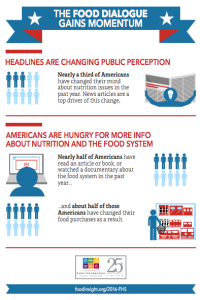As the elections fast approach, not only are there political divides across parties, but also in food issues. The 2016 Food and Health Survey: Consumer Attitudes Toward Food Safety, Nutrition & Health looks at how consumers differ in their views on food issues and find that conservatives and liberals think differently about sustainability, trust in government for food-related information and their top food safety issues. The study was conducted by the International Food Information Council (IFIC).
 “The 2016 Food & Health Survey marks the 11th edition of an ongoing investigation into the beliefs and behaviors of Americans,” said Kimberly Reed, president of the International Food Information Council Foundation. “We are seeing a growing national food dialogue, and Americans are hungry for more information about nutrition and the food system,” Reed said. “The 2016 Survey, which includes a special focus on understanding the complex array of factors that influence food decisions, provides important insights and trends for health professionals, government officials, educators, as well as others who seek to understand and improve the health of all Americans.”
“The 2016 Food & Health Survey marks the 11th edition of an ongoing investigation into the beliefs and behaviors of Americans,” said Kimberly Reed, president of the International Food Information Council Foundation. “We are seeing a growing national food dialogue, and Americans are hungry for more information about nutrition and the food system,” Reed said. “The 2016 Survey, which includes a special focus on understanding the complex array of factors that influence food decisions, provides important insights and trends for health professionals, government officials, educators, as well as others who seek to understand and improve the health of all Americans.”
In terms of sustainability, liberals more readily cite the importance of environmental aspects of sustainability while conservatives focus on economic reasons for sustainable practices. Both conservatives and liberals agree overwhelmingly that it is important for food products to be produced sustainably. However, liberals (56 percent) are much more likely than conservatives (35 percent) to say that they would pay more for sustainably produced products.
Media exposure may play a role in the differences of opinion. More than half of liberals (51 percent) report having read an article examining the food system in the past year, while about one-third (31 percent) conservatives reported doing the same. Similarly, a much larger proportion of liberals (27 percent) report seeing a movie or documentary that examined the food system in the past year, compared to conservatives. (13 percent).
Other findings include that liberals are more likely than conservatives to cite the government as a top source of trust for information on the safety of food and ingredients (58 percent vs. 46 percent). One in four (27 percent) conservatives highlighted the government as a top source of trust for information about the types of food you should eat, while nearly half of liberals (48 percent) highlight the government as a top trusted source for this information.
And in terms of food safety, concern about Foodborne illness from bacteria” ranked first among both liberals and conservatives (55 percent and 58 percent respectively). Yet liberals are far more likely to cite “pesticides” as a top food safety issue (38 percent vs. 24 percent), while conservatives are twice as likely to cite “carcinogens or cancer-causing chemicals in food” (40 percent vs. 20 percent). Those who identify as somewhat liberal (12 percent) are twice as likely as those who are somewhat conservative (6 percent) to cite “food additives and ingredients” as a top food safety issue.

